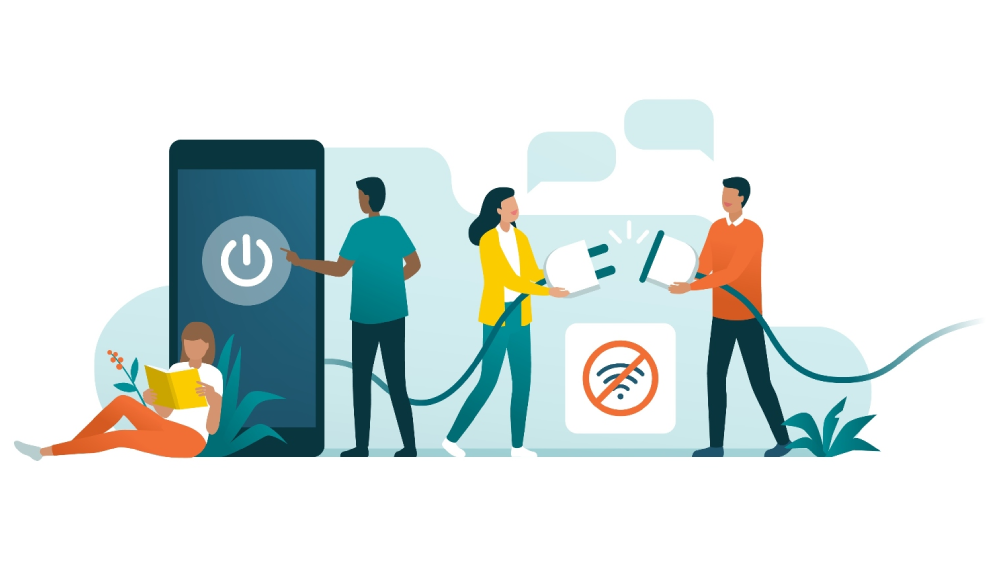All you need to know before starting a digital detox
- Overview
- What is a digital detox?
- What are the benefits of a digital detox?
- What does a digital detox actually involve?
- How do I do a digital detox?
- Are there health benefits to a digital detox?
- How long should my detox last?
- Who can benefit from one?
- The facts and figures
- Why do people start a digital detox?
- Does a detox mean all technology?
- If you’re struggling
- Related articles
Thankfully, regularly taking a break from the digital world is an option. Find out why so many people are taking on a digital detox and what switching the screen off can do for you.
What is a digital detox?

A digital detox (or tech detox) is a commitment to intentionally reduce, limit, or eliminate the use of digital devices and technology like smartphones, computers, tablets, and social media platforms.
The goal of a digital detox is to take a break from constant connectivity and screen time to recharge, focus on real-world commitments, and regain a sense of balance in life.
What are the benefits of a digital detox?
Our modern world is structured around staying connected via digital devices. The subtle reliance we have on this technology has made it difficult for many of us to go even a few hours without using a phone, tablet, or computer.
Depending on what your goals are, a digital detox can have a massive impact on your life. If you’re unsure of what time away from technology can do for you, have a look below:
Rethink your relationship with technology
A temporary detox can help you evaluate your relationship with certain apps, social media, and your usage patterns, giving you a healthier perspective and outlook when you return
Time away from social media
Social media can be an unconscious source of anxiety and stress. The expectation to appear a certain way and the fear of missing out can all contribute to an unhealthy relationship with your phone.
These social media platforms are designed to keep you coming back, so time away is a good way to evaluate and reset your relationship with them
Reduced stress and anxiety
Whether it’s monitoring work emails late into the evening or constantly checking your social media platforms, time away from technology can help reduce stress in our personal and professional lives
Better sleep
Your brain encourages the production of a chemical called melatonin when it’s tired. The bright light behind your mobile phone screen keeps the brain alert, decreasing levels of this chemical and making it harder for you to fall asleep
More time for self-care
Self-care is anything that you find makes you feel good or that recharges you. What self-care is differs from person to person.
Great examples of self-care include taking a bath, watching a favourite TV show, or taking a nap.
What does a digital detox actually involve?

The way you choose to limit or reduce your tech time is completely up to you.
Some people completely withdraw from all digital material during a detox. There are even modern wellness retreats that allow you to holiday in an environment that facilitates technology-free living. This may not be possible or desirable for everyone due to work commitments and other lifestyle factors.
For others, a technology detox involves limiting time spent on social media and gaming applications. There is a manual restriction on most smartphones that allows a user to discriminately limit screen time on certain applications. These are useful if you’re looking to be more selective about what you spend your time on.
A great way to get the most out of your detox is to spend time outside, in nature, and exercising. Make a note of all the times you would naturally retreat to your phone because you were bored. Add this time up and make a commitment to spend it doing something positive for your mind and body instead.
How do I do a digital detox?
If you’re looking to give it a go, keep the following five points in mind when planning your detox:
- Commit to a time frame: make sure you’ve got a specific time frame in mind. If it’s your first time, we recommend starting small with half a day, or one day before building it up depending on the extent of your use. If you’re finding it beneficial by the end of your second day, you can always add time on
- Define clear goals: whether this means limiting time spent on specific applications and devices, or a complete blackout, make sure you define the goals and outcomes you want to achieve
- Utilise the tools that are available: most smartphones have built-in functions and tools for limiting screen time. If you’re withdrawing from technology completely, make sure you, your friends, family, and your workplace understand what this means for them
- Fill your free time: not using technology and digital media frees up a lot of time. Make sure you have plenty of enjoyable activities booked in. You could even commit to learning a new hobby with all your new-found spare time
- Enjoy the freedom: a tech detox is designed to rejuvenate the mind and body. Relish this opportunity to learn something new, and spend time with friends and family. Reset yourself and enjoy the feelings that accompany your re-evaluation of your relationship with technology.
Are there health benefits to a digital detox?
Time away from technology has proven benefits for your health. These include improved mental health, better quality of sleep, reduced stress and anxiety, improved relationships, and better productivity.
An instant impact a lot of people see when taking time away from technology is the quality of their sleep improves. This is because the blue light that is used to light up our smartphones and computer screens negatively affects our ability to drift off at night.
- Interested in learning more? Click here for more on the health benefits of a tech detox
How long should my detox last?
A tech detox doesn’t have to take place over a long stretch of time where you’re looking at eliminating the use of technology for good.
Because we all have different relationships with digital devices, it’s difficult to gauge what the optimal amount of time for each person looks like. You may find that after a few hours, you start to notice the effects of not using your smartphone. For others, it might take three days before you feel any different.
Committing to a goal of doing a two-day technology detox is a good place to start if it’s your first time. Many people have found success starting on a Friday afternoon and finishing on Sunday evening to avoid clashes with work commitments.
Who can benefit from one?
Ever wonder how you could cope with life if modern technology vanished tomorrow? Are you burned out by too much screen time? Fed up of checking app after app for something to scratch the itch?
On average, Britons spend more time looking at a screen than they do asleep. For context on how we view our relationships with technology, 62% of us say they resent how much we use our phones.
Sound familiar? You’re not alone. If you’ve ever thought about your relationship with the screen in front of you, giving a technology detox a go might be beneficial. You might find it’s not for you and that’s okay. You may find it gives you a unique insight into your relationship with technology and that more time away from the screen means you return with a new, refreshed outlook.
The facts and figures
Technology is very much a part of our everyday lives. The facts and figures below illustrate just how reliant we are on constant connection with each other:
- The average person gets 63.5 notifications a day. Turning off notifications from companies, applications, and services can make it easier to ignore your smartphone
- Boredom is one of the biggest triggers behind technology usage. 74% of phone users aged 18 to 34 get an urge to use their smartphone when bored
- The average smartphone user checks their phone once every 12 minutes
- Gaming addiction is now a recognised medical condition
- Studies have found that as smartphone use increases, so does anxiety
- 46% of Americans say they could not live without their smartphone
Below are some of the reasons given by the two-thirds of Britons who said they “hated how much time they spend using their mobile phone”.
- It’s taking over my life – 36%
- It causes arguments with my partner – 22%
- I can’t live without it – 18%
- It prevents me switching off from work – 14%
- It stops me spending time with my family and friends - 9%
Why do people start a digital detox?
If you work in an office with screens all day, you may find that your personal relationship with technology has changed. Others find the constant onslaught of advertising and social media posts in the modern world tricky to navigate.
There are many reasons why you might want to limit your screen time. Defining why you want to take time away from tech before you start can be a valuable tool for maintaining your detox when you feel the urge to make an untimely return.
Does a detox mean all technology?
Absolutely not. How you go about your tech detox all depends on what you want from the experience.
Some people remove all technology, including screens, televisions, tablets, radios, headphones, and all sensory input from tech devices. Others take a more relaxed approach and put their smartphone down for the weekend.
If you’re new to taking time out from technology and aren’t sure where to start, take a slow and steady approach. Start by limiting time on applications that might be problematic for you. See how you feel, and slowly increase time away from your phone until you feel comfortable enough to withdraw completely.
If you’re struggling
If you’re struggling with your relationship with digital devices and are unsure of where to turn for help, you’re not alone.
Many of us find social media and digital devices a source of anxiety and stress. If this is affecting your day-to-day life, there is help available. Click here to find out more.
Write your feelings down
Reducing our time with something we rely on so heavily can have an emotional impact. Write down your feelings and what you’re experiencing during your time away from technology. This can help improve the experience for next time and give you a better understanding of certain problematic habits and relationships with digital devices.
Consider using a journal style format where you write any strong feelings you experience down alongside the date and time they occur and how intense they feel on a scale of 1 to 10.
The bottom line
A technology detox can help you reset and rethink your relationship with the screen in front of you. Whether you’re removing technology completely or simply looking to take some temporary time out, a detox can bring with it a newfound gratitude for the important things in life.
You may find you want to return, or that a tech detox isn’t for you. Either way, evaluating your relationship with your smartphone, tablet, or laptop can provide valuable insight into how we can improve the way we interact with these devices in the future.
Last updated Thursday 23 January 2025
First published on Wednesday 15 November 2023

